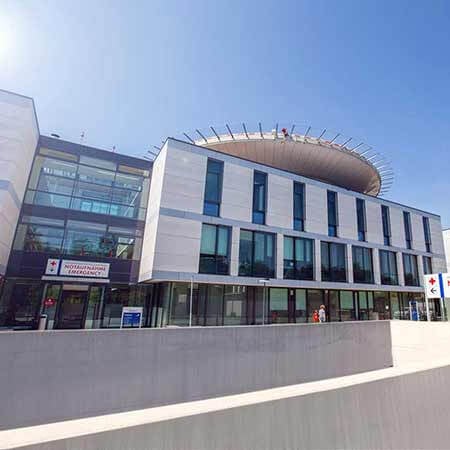About the disease
Benign tumor of brain develops when cells start to abnormally divide in the brain without causing appearance of malignancy. Most commonly, it manifests itself in the form of a mass, which is not a cancer. Most benign tumors of brain develop very gradually; months or even years can pass before it manifests itself for the first time. Even though this tumor slowly grows, it rarely affects surrounding tissues of the brain, although in some cases it can suppress certain brain tissues and structures. In such case, benign tumor of brain becomes a life-threatening condition. Most commonly, benign tumors of the brain develop as a result of a genetic predisposition. Exposure to certain chemicals and other dangerous substances and adverse environmental factors can also contribute to development of the benign tumor of brain. The good news is that in most cases it is possible to fully resect the benign tumor as it almost never metastasizes. The most important thing, however, is to get timely diagnosis to avoid such complications as compression and internal hemorrhage. The most common benign tumors of the brain are meningiomas, which develop in the brain membranes and sometimes in the membranes of the spinal cord; hemangiomas, which develops in the blood vessel;, and acoustic neuromas, which develop in the nervous system. Overall, meningiomas are the most common type of benign tumors of the brain as it accounts for approximately 20% of this type of tumor.
Symptoms
- Headache
- Dizziness
- Hearing or vision problems depending on the part of brain where tumor develops
- Nausea
- Weight loss
- Behavioral changes
- Irritation
Diagnosis
MRI and CT scan are the most commonly used imaging tests for diagnosis of tumors of the brain, as they provide image of all brain structures, tissues, and blood vessels, which allow doctor to determine the type of brain tumor, its stage and dynamics of progression.
Biopsy is used to determine if the tumor is indeed benign and to rule out the possibility of brain cancer.
Treatment
Radiosurgery (Gamma Knife) is the most commonly used type of surgery for benign tumors of the brain, as it allows surgeon to resect the tumor without making open incision. This type of surgery is also more targeted, meaning that a surgeon accesses only the tumor, thus reducing the risk of possible complications after traditional surgery. Radiosurgery usually gives very good results, as surgeons are able to resect whole tumor. A patient may need to stay in the hospital for several weeks to fully recover and get back to normal lifestyle.
Authors:
This article was edited by medical experts, board-certified doctors Dr. Nadezhda Ivanisova, and Dr. Bohdan Mykhalniuk. For the treatment of the conditions referred to in the article, you must consult a doctor; the information in the article is not intended for self-medication!
Our editorial policy, which details our commitment to accuracy and transparency, is available here. Click this link to review our policies.















